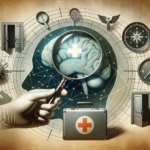Understanding Depression: Recognizing the Signs
Depression is a complex mental health condition that affects millions worldwide. Recognizing its signs early can be crucial in seeking timely help. Common symptoms include persistent sadness, loss of interest in activities once enjoyed, changes in appetite, and difficulty sleeping. While these symptoms may vary in intensity, it’s important to note that they often persist for weeks or months, impacting daily functioning.
Professional methods for identifying depression typically involve comprehensive assessments conducted by mental health professionals. These assessments may include structured interviews and standardized questionnaires designed to evaluate mood, behavior, and cognitive patterns. Such tools are essential in distinguishing depression from temporary emotional responses to life’s challenges.
It’s vital to understand that depression is not a sign of weakness or a character flaw. Instead, it is a medical condition that requires attention and care. By acknowledging the symptoms and seeking professional guidance, individuals can take the first step towards recovery and improved mental well-being.
Professional Methods for Diagnosing Depression
Diagnosing depression involves a multifaceted approach that combines clinical evaluation and diagnostic tools. Mental health professionals often employ the Diagnostic and Statistical Manual of Mental Disorders (DSM-5) criteria to assess the presence and severity of depression. This manual provides a standardized framework for identifying mental health disorders, including depression.
In addition to the DSM-5, healthcare providers may use various scales and questionnaires, such as the Beck Depression Inventory or the Hamilton Depression Rating Scale. These tools help quantify the severity of depressive symptoms and monitor changes over time. By using these methods, clinicians can tailor treatment plans to meet individual needs effectively.
It’s important to emphasize that self-diagnosis is not recommended. While online quizzes and self-assessment tools can offer insights, they cannot replace a professional evaluation. If you suspect you or someone you know may be experiencing depression, consulting a qualified mental health professional is crucial for accurate diagnosis and appropriate intervention.
Practical Treatment Advice: Navigating Your Options
Once depression is identified, exploring treatment options becomes a priority. Treatment plans are often personalized, taking into account the individual’s specific needs and preferences. Common treatments include psychotherapy, medication, or a combination of both.
Psychotherapy, such as cognitive-behavioral therapy (CBT), is highly effective in treating depression. CBT helps individuals identify and change negative thought patterns, improving emotional regulation and coping strategies. Other therapeutic approaches, like interpersonal therapy or mindfulness-based therapy, may also be beneficial, depending on the individual’s situation.
Medication, such as antidepressants, can be prescribed to help alleviate symptoms. These medications work by balancing chemicals in the brain that affect mood and emotions. It’s essential to work closely with a healthcare provider to monitor the effects and adjust dosages as needed.
In addition to professional treatment, lifestyle changes can support recovery. Regular exercise, a balanced diet, and adequate sleep contribute to overall well-being. Engaging in activities that promote relaxation and stress reduction, such as yoga or meditation, can also be advantageous.
Finding the Right Treatment Centers
Choosing the right treatment center is a critical step in managing depression effectively. When searching for a suitable facility, consider factors such as the types of therapy offered, the qualifications of the staff, and the center’s approach to treatment.
Many treatment centers provide a range of services, from outpatient therapy to intensive inpatient programs. It’s important to assess your needs and determine the level of care required. Some individuals may benefit from residential treatment, which offers a structured environment and 24-hour support, while others may find outpatient therapy sufficient.
Researching treatment centers can be overwhelming, but there are resources available to assist in the process. Online directories and reviews can provide insights into the quality and reputation of various facilities. Additionally, consulting with a healthcare provider can help guide your decision by recommending centers that align with your specific needs.
Ultimately, the right treatment center should offer a comprehensive approach to care, addressing both the psychological and physical aspects of depression. By selecting a facility that provides personalized and evidence-based treatment, individuals can embark on a path towards recovery and improved mental health.
Conclusion: Taking the First Step Towards Recovery
Recognizing and addressing depression is a significant step towards recovery. By understanding the signs, seeking professional diagnosis, and exploring treatment options, individuals can regain control over their mental health. It’s essential to remember that help is available, and reaching out for support is a courageous and vital action.
Whether you are personally affected by depression or supporting a loved one, knowledge and awareness are powerful tools. By staying informed and proactive, you can contribute to a supportive environment that fosters healing and growth. Remember, you are not alone, and with the right resources and guidance, overcoming depression is possible.








